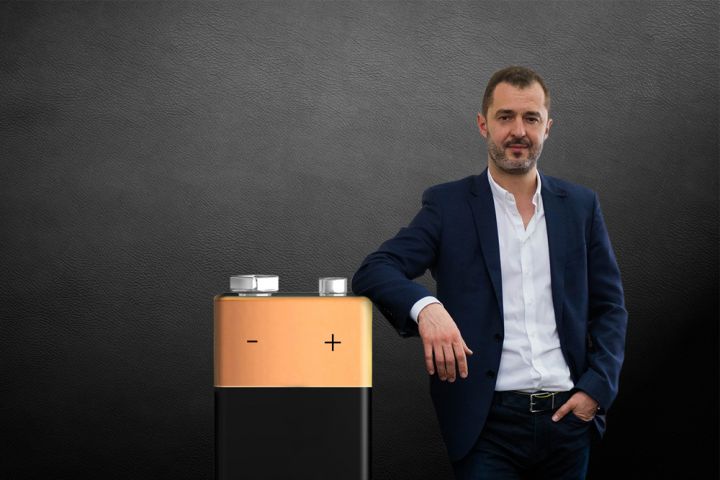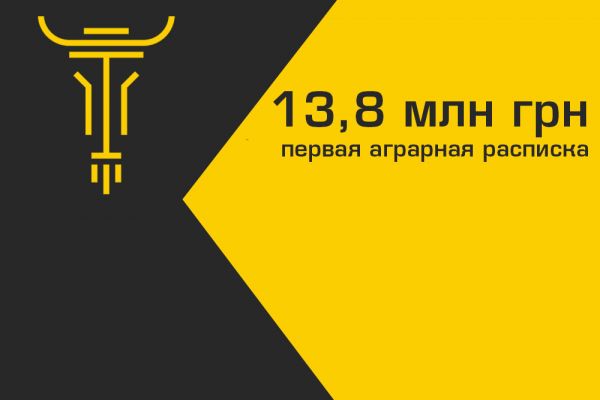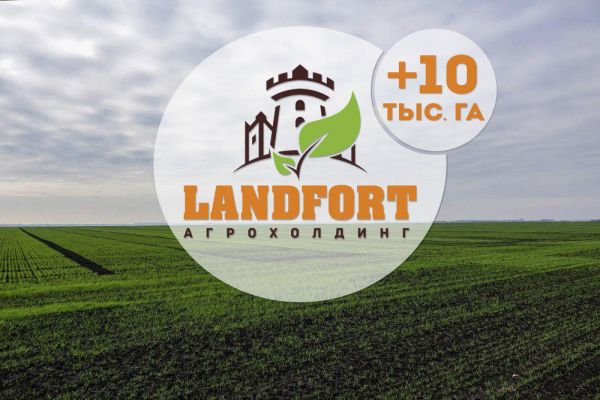The Agrarian Energizer: Vadim Kovernik about BKW Group
Agriculture is becoming more transparent, systemic and structural. Some Ukrainian agriholdings have already entered the stock market, others are just getting ready for this process, and some are simply working as if they have been there for a long time. As a result, more and more often we observe the merger of agri-companies into groups of companies and their active work in tandem with international auditors.
This year the new stars are lit as well. In 2016 the owners of Bizon-Tech Company Vadim Kovernik and Vitaly Bogovin, who are well-known in the agrarian market, consolidated all their assets into the BKW Group of companies.
Latifundist.com talked with Vadim Kovernik, also known on the market as Agrarian Energizer, about what assets the group possesses, how difficult it is to consolidate them, how to manage different business directions effectively and how to enter the TOP-5 market distributors within 5 years.
We did not start the interview straight away. We managed to watch Vadim`s wonderful ability to do 10 things and phone calls in 1 minute. We could only hope that our dictaphone would be able to keep up and record the conversation!
Latifundist.com: Vadim, please tell us about BKW Group.
Vadim Kovernik: Today BKW includes three business directions:
- Distribution of plant protection products, seeds and fertilizers — Bizon-Tech;
- Trading — this is Ambar Export BKW Company and the newly established company Ambar-Trading with its office in Switzerland;
- Own agricultural production on the area of almost 30 thousand hectares. These are 7 agricultural enterprises, which are united in LANDFORT Agriholding.
Also, we have almost completed structuring and audit of the whole BKW Group together with Deloitte, which lasted for a year and a half. Therefore, starting from July 1, we will become absolutely public for all our partners and potential investors.
Latifundist.com: Let's start from the very beginning, what was the start for you in business?
Vadim Kovernik: I started my career in 1995, when I, as a fourth-year student, joined the financial department of one of Zaporozhye companies, and in 1999 I was appointed its CEO. This company was a regional distributor of the world's leading producers in the sphere of plant protection products and seeds. I left this company in 2008 from the position of CEO, when Vitaly Bogovin offered me to become his partner. And that's when everything began ...
The Top Distributor
Latifundist.com: Which directions did you start with in Bizon-Tech?
Vadim Kovernik: Everything was conventional — the market for distribution of plant protection products, seeds of field crops and mineral fertilizers. We are also developing these three areas today, adding some options to fully meet all the needs of Ukrainian farmers. Speaking about plant protection products, we started with the world's leading manufacturers, with whom we have long-standing friendly relations — BASF, DuPont, Syngenta, Monsanto and others. In our fifth year of work, we were already among the top 4 distributors of Ukraine. And we are determined to become a leader in this segment!
As for seed companies, every year, for example, we occupy the leading position in purchasing of products from Limagrain Company. We work effectively with Syngenta, Pioneer, Maisadour and other companies. That is, we have established good business and strong partnership relations practically with all the leaders of the world seed market, we are also on friendly terms with the leadership of these companies. I consider these to be important components of our success in the market.
And today Bizon-Tech comprises 135 sales managers and 23 branches in different regions of Ukraine. In the fifth year of work, we were already among the top 4 distributors of Ukraine and we are determined to become the leader in this segment!
Latifundist.com: Tell us about Bizon-Tech's customers. Are they represented by large or small agribusiness?
Vadim Kovernik: Our client database consists of 5 thousand clients, ranging from small farms to large agricultural companies. We have about 3,5 thousand customers who are large manufacturers. Our client database is growing every year, with the increase of more than 1000 enterprises over the past two years. We are pleased that in recent years, farmers are paying more attention to the factor of professionalism instead of the price factor when choosing a distributor. I used to dream about it, and today this dream has come true.
Latifundist.com: What is distributor professionalism in your understanding?
Vadim Kovernik: Distribution today is not just "buy and sell". Our sales manager should be an agronomist, manager, lawyer, accountant, logistics and tax consultant all in one. Therefore, our team is being trained non stop. Personally, I'm in touch from 7 a.m. to midnight.
After all, every year, all our leading suppliers in Ukraine launch dozens of new products. The agrarians receive this information a little later. Therefore, the task of our manager is always to be more informed.
He must have basic knowledge of a lawyer, and act as a tax advisor to a certain degree. Experience has shown that when our state changed the VAT legislation a year ago, many agrarians did not fully understand the mechanism of the new norms. So, today one of our tasks is to provide staff with the necessary knowledge and skills.
Export Potential
Latifundist.com: Let's move on to trading. According to the results of the calendar year 2016, the Ambar Export BKW Company was among TOP-10 wheat exporters. The company also supplies rapeseed, barley, sorghum and soy. What results in terms of the volume of these crops did the company receive last year, and what are your plans for the current year?
Vadim Kovernik: Trading fit into our group very logically, especially taking into account the existing taxation regime. Since 2012 Ambar Export BKW has been operating as a trading company. Indeed, wheat occupies the lion's share in our supplies. Last year, we supplied 400 thousand tons of this crop which makes about 80% of all our exports. The supplies of other crops make 1-2 vessels per year.
In 2016 the Ambar Export BKW Company entered the TOP-10 wheat exporters. These goals are quite achievable.
Today the total staff of the Ambar Export BKW Company consists of 25 people whereas a year ago it consisted of 10 people only. For five years of our full-fledged work there was not a single case of failure to fulfill our obligations. Today's reputation allows us to be confident of successful work and long-term cooperation with our partners so that we can sleep peacefully (ed. — smiling).
Latifundist.com: Which ports do you operate through?
Vadim Kovernik: The main port which we work through is STP Berdyansk. That's where we started from. But last year we started to work through the Nikolaev Sea Commercial Port, and also in the near future we plan to work through Odessa.
Latifundist.com: In which countries do you export the products?
Vadim Kovernik: These are the countries of the Mediterranean region — Egypt, Morocco, Tunisia, Lebanon, Israel. We also export our products to Europe: Spain, Italy and others. We export wheat with a high protein content to the Italian market. The imports structure to Spain includes several crops. Besides, we have experience of work with the countries of the Persian Gulf region and this year we plan to enter the Asian market.
Latifundist.com: Which part of the exported products come from your agricultural holding, and what do you buy from the market?
Vadim Kovernik: If we are talking about grain, then out of the 400,000 tons that we exported in 2016, 50-60 thousand tons was our own grain.
Latifundist.com: Do you export all of your grain?
Vadim Kovernik: Almost all of it, but part of the grain goes to shareholders and into the seed fund of the agricultural holding LANDFORT.
Latifundist.com: In which regions do you purchase?
Vadim Kovernik: At first it was the Southeast of Ukraine, mainly Zaporozhsky Region. Starting from last year, we expanded the geography of purchases towards Nikolaev, Kherson, Dnipropetrovsk, Kirovohrad, Poltava and Kharkiv Regions. This year the company plans to work all over Ukraine.
Latifundist.com: How do you arrange logistics?
Vadim Kovernik: Today the market has developed in such a way that it is more expensive to own vehicles than to use outsourced logistics services.
We have contractual relations with large carrier companies, which will provide the required number of vehicles within a day. Our partners are experts in their business, so we do not have any problems. We have good relations with railway freight forwarders, who, despite all the problems with Ukrzaliznytsia, ensure the timely and high-quality shipping of grain to the port. We also cooperate with port operators and forwarders.
Latifundist.com: Is there a synergy among your companies?
Vadim Kovernik: Due to all our areas of operation, we provide a wide range of services: from the supply of seeds, fertilizers to the export of grown products. The latter option is especially interesting after the withdrawal of the special VAT regime. The point is that our clients should be able to become "exporters" themselves, thereby optimizing VAT payment. We help them in this and provide export escort services. Last year, we signed more than 90 contracts to support our customers` export. In the process of preparing for the sowing campaign all agrarians acquire seeds, plant protection products, fertilizers, fuels and lubricants, and agricultural machinery. All these costs include VAT.
Thus, throughout spring they earn themselves tax credit. But not all costs include VAT (units payment, wages, etc.). And when the sale of agricultural products takes place in summer and autumn, there are tax liabilities that can be significantly higher than a loan. And as a consequence, it is necessary to pay VAT to the budget. When exporting agricultural products, a zero VAT rate is applied, which entails significant savings in cash. Many of the agrarians do not know foreign markets and buyers. Therefore, Ambar Export BKW helps them export these products and receive foreign currency earnings. Last year we signed about 90 of such contracts-commissions.
Latifundist.com: You have mentioned a new company in Switzerland, what is its role?
Vadim Kovernik: We have created the company Ambar Trading with a head office in Switzerland this year. It is a company with European values, modern approaches to the organization of business processes and of course its settlement account is in a Swiss bank. The task of Ambar Trading is to attract financing from abroad and to direct all of it to purchases in Ukraine. In turn, the domestic company Ambar Export BKW will purchase in Ukraine for the hryvnia and deliver goods to the ports of Nikolaev, Odessa and Berdyansk. Further tasks are shifted to Ambar Trading, including
chartering vessels, searching for buyers, selling and, most importantly, ensuring obtaining foreign currency earnings in Ukraine. Ambar Trading is an independent company that can work in Ukraine not only with Ambar Export BKW, but also with other interested suppliers of agricultural products.
Own Agricultural Production
Latifundist.com: How did LANDFORT enter the BKW structure? Why did you decide to engage in agricultural production?
Vadim Kovernik: The first purchase of agricultural assets took place in 2009. It was the firm Solodkovodnoe in Zaporozhye Region with a landbank of about 3 thousand hectares. After that during 5 years we were annually obtaining agricultural enterprises, both through purchase and due to circumstances — for debts. We were working hard and successfully, we were expanding, and after a while we already owned 9 enterprises. After that we did the internal structuring, and as of today these are 7 legal entities with the common land bank of almost 30 thousand hectares in cultivation.
Latifundist.com: Are there plans to expand the land bank?
Vadim Kovernik: We plan to increase the bank to 50 thousand hectares within 3 years. I think that we will not stop, because currently out of three BKW spheres of activities — distribution, trading and agricultural production – agriculture is the most profitable one.
Latifundist.com: It is ambitious. In which territories of Ukraine do you plan to expand the land bank?
Vadim Kovernik: Despite the fact that our experience and technical equipment allows us to perform all agrotechnical work very efficiently in the Southeast, where we have most of the land, I would like to diversify the regions a little.
Therefore, now we are looking at the acquisition of agricultural assets in Central and Western Ukraine, where the lack of precipitation does not affect yields so much.
Latifundist.com: Are you engaged with niche cultures?
Vadim Kovernik: Our lands do not allow us to work with a wide crop rotation, because many of the crop varieties that could be sown in Cherkassy, Khmelnitsky or Kiev Regions, could demonstrate very poor results in our area. Therefore, we are looking for the crops which increase our marginality.
The world economic processes and the fall in oil prices result in the price dicrease in the agricultural products market. But on the contrary, the prices for some niche crops increase. Therefore, we are now looking at such areas as, for example, the production of pumpkin and pumpkin seeds, as well as their exports. The same can be said about peas. In addition, we are now even laying out a nut orchard, we are studying Ukrainian and European experience in the sphere of horticulture. But this is an investment for 25 years ahead.
Latifundist.com: What are the company's grain storage and processing capacities? How are they used?
Vadim Kovernik: We possess grain storages with the capacity of 110 thousand tons. At the moment, that`s enough.
Latifundist.com: Do you have plans to upgrade them?
Vadim Kovernik: We thought about this, but decided against building our linear elevators. If we talk about the Ambar Export BKW business model, the outsourcing services are available in all parts of Ukraine, and we store our products in those facilities. Also all our customers-suppliers have their own storage facilities. We use the services of linear elevators only in exceptional circumstances.
Previously, we considered the possibility of building a port elevator, but the amount of port capacities on the Black Sea and the Sea of Azov currently so much exceeds the volume of agricultural products that the seaports rates dicrease significantly every year. We currently work with Berdyansk using $8/ton transshipment rate, whereas earlier it made $14 per ton. Taking into account such price reduction it is not economically profitable for our business model to invest in the elevator capacities. The banks constantly ask us about it as well. For some reason it is an important indicator for them.
There are some companies today, which own the storages with the capacity of 1-2 and more million tons, but they do not load them at full capacity.
Latifundist.com: Are you considering working in area of stockbreeding?
Vadim Kovernik: This is a very long and philosophical question. The current prices for livestock products demonstrate that it is now not profitable to develop this business from scratch. If we acquire an agricultural asset that already has an established livestock farming, we will definitely support it and develop it.
Latifundist.com: How actively are you credited?
Vadim Kovernik: The main banks that credit the agricultural sector of economy are also our partner banks. First of all, these are Raiffeisen Bank Aval and PJSC CREDIT AGRICOLE BANK. There was also UniCredit Group, which works through Ukrsotsbank in Ukraine. After the merger of Ukrsotsbank with Alfa-Bank, the latter has become our partner as well. In addition, we have a long-standing relationship with MetaBank, which has a very well developed branch network in Zaporozhye Region.
Pivdenny Bank is our main partner bank financing our trading, we are comfortable working with it, and now we are negotiating to increase the credit line. This year, TAS and OTP Bank became our partner banks.
Latifundist.com: Do you have any foreign creditors?
Vadim Kovernik: Our foreign creditors are Credit Agricole and Raiffeisen Bank, we are working with them through Ukrainian subsidiaries. But after the audit statements are published, which will be in summer, the Ukrainian leadership of these banks will ask their headquarters to increase the credit limits for our enterprises. Our results, ambitions and plans are growing, and the limits of the Ukrainian subsidiaries are quite restricted so far.
Latifundist.com: Do you think of going to IPO over time?
Vadim Kovernik: Several times I was asked how much my company cost. And several times my rhetoric changed radically. It is always painful selling your creation, as long as you have a desire to work and healthy ambitions. I believe that as of today I still have 15-20 years of full-time active working age, and I want to bring this company to the level where it will really cost significant money. All those negative factors that affect the company's value today: the country's rating, political instability, struggle for power, the war, all those factors do not add to the investment attractiveness of our country and business.
As soon as a number of these negative factors disappear, the rating of Ukraine will increase several times. We have a task to make an efficient company with good business volumes and financial indicators, which will be confirmed by Deloitte.
Latifundist.com: What other directions can have potential for BKW?
Vadim Kovernik: At the moment we are creating digital department in BKW structure, which will work taking into account all the world trends. It is hard to predict the result of its work. For example, many of our partners give up the 3-5-year strategy, because it is very difficult to build such long-term forecasts in our days.
Each year, some innovative solutions are developed, so the strategy and tactics of company development in different areas of business should also change.
Latifundist.com: Where do you get so much strength and energy from?
Vadim Kovernik: There can be no other way. I develop myself and create a team of leaders in the company, and the company, in its turn, occupies a leading position in the industry. I do not plan to leave for another country, I will live here and improve myself, my environment and my country. Isn't this the mission of every person?
Latifundist.com: Thank you for such interesting and energetic conversation!




